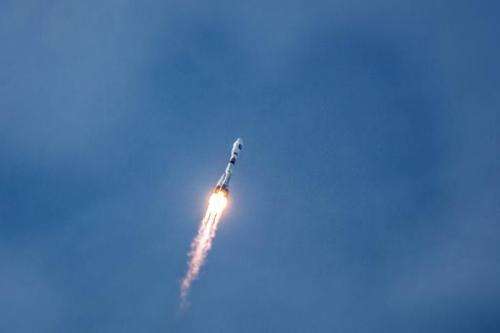New delay for launch of Europe navigation satellites (Update)

Bad weather delayed the liftoff Thursday of a rocket with two new satellites for Europe's rival to GPS, launch firm Arianespace said as it announced 12 orbiters will join the constellation from next year.
The liftoff of the fifth and sixth Galileo satellites, already delayed by more than a year, had been scheduled for 1231 GMT from the European space centre at Kourou in French Guiana on a Russian-made Soyuz rocket on Thursday.
But "unfavourable" weather intervened to cause an indefinite delay, Arianespace said in a statement.
"Another launch date will be decided depending on the evolution of the weather conditions in Kourou," it said.
Arianespace also announced it had signed a deal with the European Space Agency (ESA) to launch 12 more satellites "from 2015 onwards", for the EU-funded Galileo network.
The staggered launches aboard three dedicated Ariane 5 ES rockets would "step up the deployment" of the navigation system, the company said, without specifying over what period they would happen.
The 5.4-billion-euro ($7.2-billion) Galileo constellation is designed to provide an alternative in case of signal failure on the existing US Global Positioning System (GPS) and Russia's Glonass, and will have search and rescue capabilities.
Four satellites have been launched to date—the first pair in October 2011 and the second a year later. It will ultimately comprise 27 satellites and three reserves.
Previous delays in the launch of orbiters SAT 5 and SAT 6 had been blamed on what ESA described as "technical difficulties in the setting up of the production line and test tools".
The agency has previously said that 18 satellites should be able to provide initial navigation services to users "by mid-decade", with full services from the complete 30-part constellation "scheduled for the decade's end".
In March last year, the ESA said Galileo's first four test satellites had passed a milestone by pinpointing their first ground location, with an accuracy of between 10 and 15 metres (32 to 49 feet).
© 2014 AFP




















